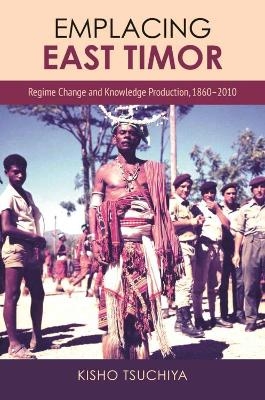
Emplacing East Timor
Regime Change and Knowledge Production, 1860-2010
Seiten
2024
University of Hawai'i Press (Verlag)
978-0-8248-9498-6 (ISBN)
University of Hawai'i Press (Verlag)
978-0-8248-9498-6 (ISBN)
- Lieferbar (Termin unbekannt)
- Versandkostenfrei innerhalb Deutschlands
- Auch auf Rechnung
- Verfügbarkeit in der Filiale vor Ort prüfen
- Artikel merken
Explores the relationship between the cycle of regime change and that of knowledge production, offering an alternative framework to periodize the history from 1850s to 2010s. Kisho Tsuchiya shows that the prevailing perceptions of East Timor have been shaped by large-scale wars, postwar consolidation, and the dominance of foreign observers.
Emplacing East Timor explores the relationship between the cycle of regime change and that of knowledge production, offering an alternative framework to periodize the history from 1850s to 2010s. Kisho Tsuchiya shows that the prevailing perceptions of East Timor have been shaped by large-scale wars, postwar consolidation, and the dominance of foreign observers. The transitions that construct what we know about East Timor have followed the rhythm of devastating violence and regime transformations. Playing a role as well are personal, institutional, and geopolitical interests and the creativity of Timorese and foreign observers. Acknowledging this cycle, Tsuchiya interweaves narrative of crucial events and political movements with an analysis of Timor’s connections to global circulations and historical transitions. He traces key persons and communities that shaped the contour of East Timor—from Portuguese colonial officers to anthropologists, Japanese occupiers to Australian activists, and Timorese poets to revolutionaries. Their experiences and imaginations of (East) Timor have been expressed through scholarly works, secret documents, policy statements, ceremonies, revolutionary songs, and museums.
Using multi-archival historical research, the author introduces sources in several languages and provides missing links, including secret documents in Portuguese archives and the National Archives of Timor-Leste, Japanese wartime sources, and Timorese sources in the Archives of Timorese Resistance. Emplacing East Timor skillfully synthesizes nationalism studies and borderland studies, creating a comprehensive approach to modern East Timorese national imaginings, the historical role of territorial borders, and its postcolonial problems.
Emplacing East Timor explores the relationship between the cycle of regime change and that of knowledge production, offering an alternative framework to periodize the history from 1850s to 2010s. Kisho Tsuchiya shows that the prevailing perceptions of East Timor have been shaped by large-scale wars, postwar consolidation, and the dominance of foreign observers. The transitions that construct what we know about East Timor have followed the rhythm of devastating violence and regime transformations. Playing a role as well are personal, institutional, and geopolitical interests and the creativity of Timorese and foreign observers. Acknowledging this cycle, Tsuchiya interweaves narrative of crucial events and political movements with an analysis of Timor’s connections to global circulations and historical transitions. He traces key persons and communities that shaped the contour of East Timor—from Portuguese colonial officers to anthropologists, Japanese occupiers to Australian activists, and Timorese poets to revolutionaries. Their experiences and imaginations of (East) Timor have been expressed through scholarly works, secret documents, policy statements, ceremonies, revolutionary songs, and museums.
Using multi-archival historical research, the author introduces sources in several languages and provides missing links, including secret documents in Portuguese archives and the National Archives of Timor-Leste, Japanese wartime sources, and Timorese sources in the Archives of Timorese Resistance. Emplacing East Timor skillfully synthesizes nationalism studies and borderland studies, creating a comprehensive approach to modern East Timorese national imaginings, the historical role of territorial borders, and its postcolonial problems.
Kisho Tsuchiya is assistant professor in the Center for Southeast Asian Studies, Kyoto University.
| Erscheinungsdatum | 04.06.2024 |
|---|---|
| Zusatzinfo | 12 b&w illustrations |
| Verlagsort | Honolulu, HI |
| Sprache | englisch |
| Maße | 152 x 229 mm |
| Gewicht | 272 g |
| Themenwelt | Geisteswissenschaften ► Geschichte ► Regional- / Ländergeschichte |
| Geschichte ► Teilgebiete der Geschichte ► Wirtschaftsgeschichte | |
| Sozialwissenschaften ► Politik / Verwaltung ► Europäische / Internationale Politik | |
| Sozialwissenschaften ► Politik / Verwaltung ► Vergleichende Politikwissenschaften | |
| ISBN-10 | 0-8248-9498-7 / 0824894987 |
| ISBN-13 | 978-0-8248-9498-6 / 9780824894986 |
| Zustand | Neuware |
| Haben Sie eine Frage zum Produkt? |
Mehr entdecken
aus dem Bereich
aus dem Bereich
die Ukraine, Polen und der Irrweg in der russischen Geschichte
Buch | Hardcover (2023)
C.H.Beck (Verlag)
28,00 €
eine Globalgeschichte des Kapitalismus
Buch | Hardcover (2023)
C.H.Beck (Verlag)
38,00 €


